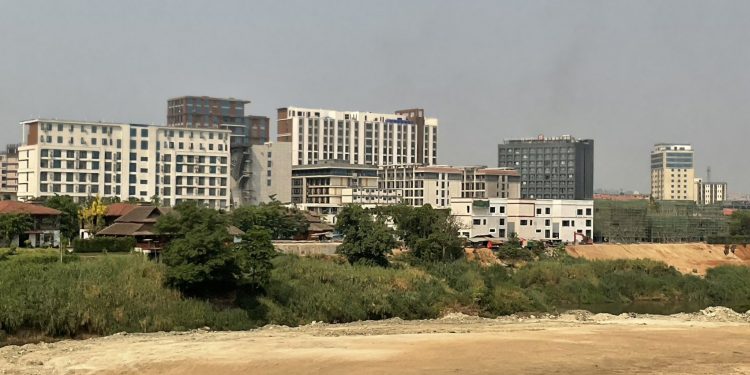The number of scam centers established by Chinese-led crime networks in Karen State along the Thai-Myanmar border has grown visibly since compounds on the Chinese frontier were shut down, with dozens of new centers having sprung up, according to a report by a US think-tank.
The United States Institute of Peace (USIP) urged the US and Thai governments to exert leadership in supporting “a strong and timely response to the situation in Karen State and its connection to the regional Chinese criminal network as a whole”.
Last year, after much pressure from China, Kokang ethnic armed forces and the Myanmar junta cracked down on online scam syndicates along China’s border with Myanmar in northern Shan State. The campaign resulted in the repatriation of almost 45,000 people from the scam syndicates’ compounds on the border, including major crime bosses.
While the China-initiated crackdown forced many scam centers along the border to close, it also prompted many to migrate to Karen State in southern Myanmar.
The USIP report also said some of the syndicates have relocated to Laos and Cambodia, while others have regenerated in Myanmar’s eastern Shan State, around Tachileik and in the territories controlled by the United Wa State Army and the National Democratic Alliance Army (Mongla).
“But the vast majority has been absorbed by criminal zones in Karen State on the Thai border, while the Karen militia forces harboring them have realigned to distance themselves from the junta to better secure their criminal empires,” it said.
It warned that these developments have contributed to the escalation of the conflict on the Thai border, as “various groups in Karen now see the coup regime as more liability than protector for illicit business”.
“Curiously, neither Chinese nor Thai law enforcement seem willing or able to challenge these operations, and the Karen armed groups protecting them remain openly defiant,” it adds.
Involvement of Karen armed groups
The report said key actors from Karen armed groups are involved in providing space and security for scam criminal activity, and are otherwise fully complicit in it. It names five senior members of the Karen National Army (formerly the Border Guard Force, or BGF), the Democratic Karen Benevolent Army (DKBA) and the Karen National Liberation Army (KNLA).
They are Colonel Saw (Maung) Chit Thu, Lieutenant Colonel Mote Thone and Major Tin Win from the BGF; Sai Kyaw Hla from the DKBA; and Roger Khin from the KNLA.
Both the KNA and DKBA are associated with the regime.
In Karen State, Chinese authorities have worked closely with the military regime and Thai authorities to secure repatriation of over 900 Chinese nationals held in compounds around Myawaddy near the Thai border. But, USIP said, they have refrained from the direct action they took in Shan State and have not issued arrest warrants for the Karen BGF or other militia leaders involved in criminal activity targeting China.
“Neither Thai nor Chinese law enforcement has moved actively against him [Saw Chit Thu] or two other BGF leaders involved in the criminal activity, while the junta’s ejection from the area leaves it effectively powerless to do so, even under Chinese pressure,” said the report.
It explained that the network of scam centers in Karen State presents a more complicated set of conflicting interests than existed along China’s border, where the fraud schemes were all run by local Chinese-speaking armed groups subject to considerable Chinese influence.
“In Karen, a wider set of internal and international actors makes organizing law enforcement action more difficult. As a result, Chinese network operators and local hosts have more freedom to forge ahead with expansion,” the report said.

















